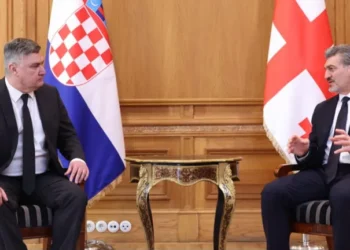Tensions in Georgia continue to escalate following the October 26 elections, as both European lawmakers and international leaders voice their concerns over widespread allegations of fraud, intimidation, and electoral misconduct. Several MEPs and key figures have condemned the lack of legitimacy surrounding the elections, calling for a thorough investigation and stronger action from the international community.
During a plenary session of the European Parliament, MEP Nathalie Loiseau, who participated in an election observation mission in Georgia, reported witnessing instances of fraud and voter intimidation.
“My six colleagues and I saw clear signs of manipulation during the election,” Loiseau stated, emphasizing that the October elections could not be deemed free or fair. Similarly, Markéta Gregorová, who had observed the 2021 elections in Georgia, noted a troubling increase in violations this time, including ballot stuffing, voter intimidation, and forgery. “This is part of a broader democratic backsliding under the current government,” she warned, urging that those responsible be held accountable.
Margaritis Schinas, Vice-President of the European Commission, said, “These elections do not meet the standards expected of an EU candidate country. The ruling party took advantage of an uneven playing field, using its considerable resources and fear of war to portray itself as the only political force capable of ensuring peace and stability.”
Former Georgian Prime Minister Giorgi Gakharia pointed out that no international body had recognized the elections as legitimate, leaving their results in doubt. “The Georgian people deserve to know that their voices are heard and respected,” Gakharia stressed, calling for an in-depth investigation to address these legitimacy concerns.
Georgian Prime Minister Giorgi Gakharia pointed out that no international body had recognized the elections as legitimate, leaving their results in doubt. “The Georgian people deserve to know that their voices are heard and respected,” Gakharia stressed, calling for an in-depth investigation to address these legitimacy concerns.
Amid the growing unrest, widespread protests have erupted across Georgia, with demonstrators waving both Georgian and European Union flags in a bid to secure EU support. Loiseau highlighted the heightened expectations of the Georgian people, who are looking to the European Union for a firm stance on the issue. “The European Council failed to address these concerns at their last meeting,” Loiseau lamented. “We must not remain silent while democracy is under threat in Georgia. We must debate and pass a resolution to support the Georgian people.”
EU foreign policy chief Josep Borrell also weighed in, calling on Georgia to address the electoral issues if it hopes to continue its path toward European integration. “If Georgia wants to join the European Union, they must amend the laws they passed, investigate the issues observed during the elections, and realign with the European path,” Borrell stated, underscoring the need for significant reforms if Georgia is to retain its EU candidacy.
In response to the political crisis, a delegation of eight EU parliamentarians, including Michael Roth from Germany, Zygimantas Pavilionis from Lithuania, and Jukka Kopra from Finland, visited Tbilisi on November 11 to stand in solidarity with the Georgian protesters. Roth emphasized that democracy in Georgia remains alive because of its people, not the ruling government. “You deserve to be part of Europe,” Roth stated. “The mission is accomplished, not because of your ruling party, but because of you. Democracy is alive because of the Georgian people.”
Pavilionis echoed these sentiments, urging the Georgian people to continue their fight for democracy and European integration. “You are Europe,” he declared. “Keep fighting for freedom, democracy, and EU membership.” Kopra, who recalled his first visit to Georgia during Soviet rule, reminded Georgians of their long history of resistance and their potential to bring about democratic change. “You have everything it takes to bring democracy to your country,” he affirmed.
Mihau Kaminski from Poland also expressed his steadfast support, recalling his previous solidarity with Georgia during the 2008 Russian invasion. “Georgia survived Russian aggression,” Kaminski stated. “And you will win. You will be free, and Georgia will be part of Europe.”
Dispute Over EU Delegation’s Visit: Georgian Government Refuses to Meet
The Georgian government expressed disdain toward the parliamentarians’ visit. Kakha Kaladze, a senior Georgian official and mayor of Tbilisi, dismissed the delegation’s statements, calling them “idle people” who “sometimes visit one country and sometimes another.” Kaladze accused the visiting politicians of trying to create chaos and undermine stability in Georgia. “Europe and the European Union are built on certain values, and one of them is peace. Yet, these individuals claim to speak on behalf of Europe while doing everything possible to create chaos in our country,” Kaladze asserted.
The Speaker of the Parliament of Georgia, Shalva Papuashvili, also refused to meet with the visiting EU delegation. In a written statement shared on Facebook, Papuashvili explained that he had declined the meeting request due to the critical attitude of several members of the delegation, particularly Žygimantas Pavilionis, the chairman of the Foreign Relations Committee of Lithuania’s Seimas, who has been openly critical of the Georgian government. Papuashvili accused the delegation of meddling in Georgia’s internal affairs and interfering with the country’s elections. “During the pre-election campaign, some members of the delegation violated Georgian legislation by publicly campaigning against the ruling party and supporting the opposition,” he stated. “This is clearly a politically biased visit.”
While Papuashvili expressed his willingness to engage in dialogue with other EU members, he made it clear that he could not meet with this delegation, citing their unfriendly and biased approach. The delegation’s members, which also included officials from Germany, Finland, Sweden, France, Latvia, Estonia, and Poland, have been vocal in their support for Georgian democracy and European integration, which has led to a growing rift between the Georgian government and certain EU officials.
As tensions between Georgia and the European Union continue to mount, the international community’s pressure for transparency, electoral reform, and a firm stance in support of Georgian democracy is likely to intensify.
By Team GT














